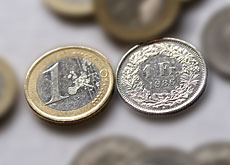swiss franc is no longer the only safe haven

For decades, investors around the world have used the Swiss franc as a safe haven currency when politics took a turn for the worse.
But the Swiss currency is losing this prestigious role to the new kid on the block, the euro, whose stability rivals that of the franc.
Any time a geopolitical or economic crisis would break out, investors would turn to the Swiss franc in search of stability. The Swiss National Bank (SNB) would try in vain to halt its appreciation since it could do untold damage to the country’s export-reliant economy.
This was particularly true before the first Gulf War in 1991, during the European monetary crisis a year later, the Asian crash in 1997, and in the aftermath of the terrorist attacks on the United States in 2001.
And in 2002, the year the euro was introduced as legal tender, the franc went from strength to strength, reaching SFr1.45 against the single European currency at one point.
This was worse than the SFr1.50 level Swiss exporters feared.
Swiss exports suffered as investors sought refuge in the franc. But the situation has since changed. The dollar rose to more reasonable levels in 2004, and the franc and euro exchange rate has remained stable.
Identical policies
“This stability is due to the almost identical monetary policies of the European Central Bank and the SNB,” said Christoph Koellreuter, director of the Basel Economics research centre.
“Both banks are seeking stability [for their currencies] and the economies of countries in the euro
zone and Switzerland are growing at the same rate.”
According to Koellreuter, monetary markets also believe in the euro’s value as a currency, adding to its attractiveness.
The president of the SNB, Jean-Pierre Roth, has warned that small currencies such as the franc had become less interesting for speculators.
If the economy were to suffer, the euro would most likely serve as a safe haven for investors.
“A few years ago, banks were asked to base their investment policies heavily on the franc,” said Aldo Visani, chief economist at the Banca del Gottardo.
“Today investment policy tends to favour the euro, even at Swiss banks.”
A weakened franc is good news for Switzerland’s export industry and the country’s banking sector should not suffer as long as politics, institutions and the economy remain stable.
No damage
This seems to be the case so far. The 29.8 per cent increase in foreign assets managed by Swiss banks – SFr2,254 billion last year – is just one indication that a less attractive franc has not hurt the important financial sector.
“What we see are trends so far,” admits Visani. “There is no proof
that investors are dropping the franc in favour of the euro yet, and there have been no major crises in the past two years.”
The arrival of the euro and the relative stability of its monetary zone have however made it a credible alternative to the franc, although the Swiss currency still has plenty going for it.
“The franc and Switzerland are still an attractive option, even with the euro,” said Koellreuter. “Banking secrecy, low inflation, and lower interest rates than elsewhere in Europe are plenty of reasons why the franc has kept its advantage.”
swissinfo, Marzio Pescia
Almost 60% of Swiss exports go to the European Union.
The franc-euro exchange rate is therefore of vital importance to the Swiss economy.
Since the beginning of 2004, the exchange rate between the two currencies has remained stable.

In compliance with the JTI standards
More: SWI swissinfo.ch certified by the Journalism Trust Initiative
You can find an overview of ongoing debates with our journalists here . Please join us!
If you want to start a conversation about a topic raised in this article or want to report factual errors, email us at english@swissinfo.ch.